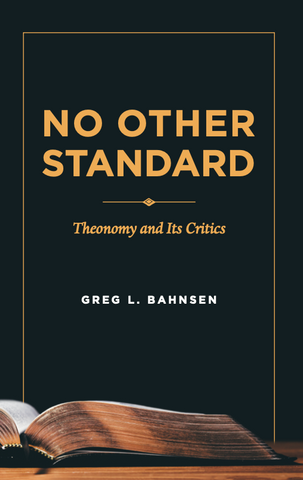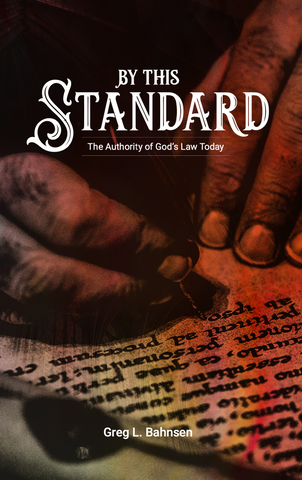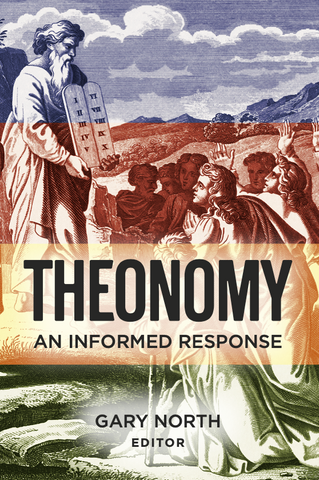There are numerous critics of the application of God’s law found in the Old Testament as a standard of righteousness in the New Testament. It seems that anyone who advocates such a position has a misunderstanding of fulfillment. It’s a common charge that has been answered numerous times. The letter to the Hebrews describes in detail what laws from the Old Covenant no longer apply, and there isn’t a single moral law mentioned. In fact, we find that as New Covenant believers that we should have our “senses trained to discern good and evil” (Heb. 5:11-14). By what standard?

No Other Standard
No Other Standard is Dr. Bahnsen’s response to various books, articles, and other critiques that have circulated over the years. Bahnsen skillfully takes his critics’ arguments apart, showing that they have either misrepresented his position or misrepresented the Bible. Line by line, point by point, he shows that they have not understood his arguments and have also not understood the vulnerability of their own logical and theological positions. Joe Louis once said of an ill-fated scheduled opponent in the ring, “He can run, but he can’t hide.” Likewise, Bahnsen’s critics. No Other Standard corners them all, and one by one, floors them.
Buy NowI saved a 2022 post from Twitter/X from Phil Vischer,[1] the creator of VeggieTales,[2] that was a response to Megan Basham, the author of Shepherds for Sale: How Evangelical Leaders Traded the Truth for a Leftist Agenda (2024), who was calling the Pharisees to account and how Jesus used harsh words to condemn them. Basham noted that these Pharisees were “some of Jesus’ neighbors.” She then wrote: “The only-gentle, only-soft Christ is a myth, perpetrated to allow wolves to come into the church [Acts 20:29-30] and lead some to Hell by preaching a Jesus who did not harshly confront the sin of those who were brazenly rewriting God’s law.”
Vischer’s response was typical of how many Christians understand God’s law and have been duped by those who believe following God’s law is Pharisaical:
Actually, Megan, the Pharisees were the ones following God’s law to a tee. They were the strictest of the law followers. What they weren’t doing is loving their neighbors. This was Jesus saying “calling ‘Lord, Lord’ means nothing if you don’t love.
This is nonsense as anyone who has studied the New Testament knows. Jesus condemned the Pharisees, not for keeping God’s law (Matt. 23:1-2) but for nullifying the law through their man-made traditions (Mark 7:1-13). James Jordan’s comments get it right:
We are used to thinking of the scribes and Pharisees as meticulous men who carefully observed the jots and tittles. This is not the portrait found in the Gospels. The scribes and Pharisees that Jesus encountered were grossly, obviously, and flagrantly breaking the Mosaic law, while keeping all kinds of man-made traditions. Jesus’ condemnation of them in Matthew 23 certainly makes this clear, as does a famous story in John 8. There we read that the scribes and Pharisees brought to Jesus a woman taken “in the very act” of adultery (John 8:1-11). How did they know where to find her? Where was the man who was caught with her? Apparently he was one of their cronies. Also, when Jesus asked for anyone “without sin” (that is, not guilty of the same crime) to cast the first stone, they all went away, because they were all adulterers.[3]
Are we to believe that while laws regarding incest (Lev. 18:8; Deut. 22:30; 27:20) apply in the New Testament (1 Cor. 5:1-2), laws against sex with animals (Ex. 22:29), abortion (Ex. 21:22-25), kidnapping (Deut. 24:7), arson (Ex. 22:6), or cursing the deaf or tripping blind people (Lev. 19:14) do not apply? Some might say that most of these are common sense prohibitions. If this is the argument, then they were also common sense regulations in Moses’ day.

By This Standard: The Authority of God's Law Today
God's Law is Christianity's tool of dominion. This is where any discussion of God's law ultimately arrives: the issue of dominion. Ask yourself: Who is to rule on earth, Christ or Satan? Whose followers have the ethically acceptable tool of dominion, Christ's or Satan's? What is this tool of dominion, the Biblically revealed law of God, or the law of self-proclaimed autonomous man? Whose word is sovereign, God's or man's?
Buy NowHow about “just weights and measures” (Lev. 19:35-36; Deut. 25:13-16)? This law is repeated in Proverbs (11:1; 20:10) but not in the NT. I suppose this law would come under the commandment not to steal, the Eighth Commandment. But why mention these specific laws from the OT if they are reasonably covered by the Eighth Commandment? The Apostle Paul writes:
It is actually reported that there is immorality among you, and immorality of such a kind as does not exist even among the Gentiles, that someone has his father’s wife. You have become arrogant and have not mourned instead so that the one who had done this deed would be removed from your midst (1 Cor. 5:1-2; cf. 7:1-3).
Some sexual impropriety had taken place in the Corinthian church. Paul references Old Testament law (Lev. 18:8; Deut. 22:30; 27:20). The Bible required that the unrepentant person had to be removed from the church and treated as an unbeliever (see Matt. 18:15-20). This would have been done by the elders after all remedies for reconciliation had failed. Paul writes, “I have decided to deliver such a one to Satan for the destruction of his flesh, so that his spirit may be saved in the day of the Lord Jesus” (1 Cor. 5:5). The old leaven was to be cleaned out so the new leaven would not be affected (1 Cor. 5:6-7). I guess the accused should have told Paul, “That’s ‘Jewish Law.’ It doesn’t apply under the New Covenant.” A preterist might say, “That law is still in effect, but it will be done away with when Jesus returns to put an end to the Old Covenant Law” in AD 70. This makes no sense since we learn from various examples that specific Old Covenant laws were done away with prior to the judgment coming of Jesus before their generation passed away, circumcision being the most evident example.
Some years ago, I participated in a discussion with a group of dispensationalists about the kingdom of God. Naturally, the subject of the law came up. Dr. Harold Hoehner, at the time a professor of New Testament at Dallas Theological Seminary, said, “Well, if something isn’t repeated in the New Testament, it’s not applicable today.”

Theonomy: An Informed Response
Christendom is a civilization—the kingdom of God in history—that is governed in every area, every nook and cranny, by God: a society whose lawfully anointed rulers govern in terms of God’s revealed law. In this view, God is not in retirement or on vacation; He is a King who has delegated to His officers the authority to exercise command. There are three covenantal institutions: family, church, and state. To deny that God’s covenant law applies to civil government in New Testament times is necessarily to abandon the ideal of Christendom.
Buy NowDavid Chilton asked this pointed question in response: “So if your pastor was found to have had sex with an animal, what would you say?” And Hoehner responded, “Since it’s not repeated in the New Testament, it’s not a sin.”
The other DTS professors backed away from Hoehner’s claim. They remarked, “the prohibition comes under laws governing fornication. The New Testament forbids fornication.” I responded, “I agree with you. It is covered under the provision regarding fornication. How do you know what constitutes fornication from the New Testament alone?”
They knew they were trapped. “The Old Testament defines fornication,” they said.
What do we do with an Old Covenant law (Ex. 21:17; Lev. 20:9) that Jesus uses against the Pharisees concerning the death penalty for “he who speaks evil of father or mother” (Mark 7:10)? Of course, Jesus was not addressing little children. He was condemning the way the Pharisees were manipulating God’s law to avoid its practical applications and thereby “neglecting the commandment of God” and setting it aside “in order to keep [their] tradition” (vv. 8-9). Jesus not only rejected their unbiblical traditions, but He also quoted a law from the Torah to condemn them.
Jesus repeated the commandment in the NT. Is it still applicable? I guess some would say that it only applied before the cross. Then what do we make of the woman caught in the act of adultery? Did Jesus overturn the sanction for this prohibition? Some scholars believe He did. Then why not the commandment regarding rebellious children?
Check back for Part 2.
[1] Vischer used the “love your neighbor” argument to push the COVID “vaccine” and argued “that evangelicals should take a more ‘nuanced’ position on abortion.” Basham, Shepherds For Sale (New York: HarperCollins, 2024), 95, xxi.
[2] For a critique of VeggieTales, get the free PDF download of MeatyTales!
[3] James B. Jordan, Through New Eyes: Developing a Biblical View of the World (Brentwood, TN: Wolgemuth & Hyatt, Publishers, Inc., 1988), 261.

